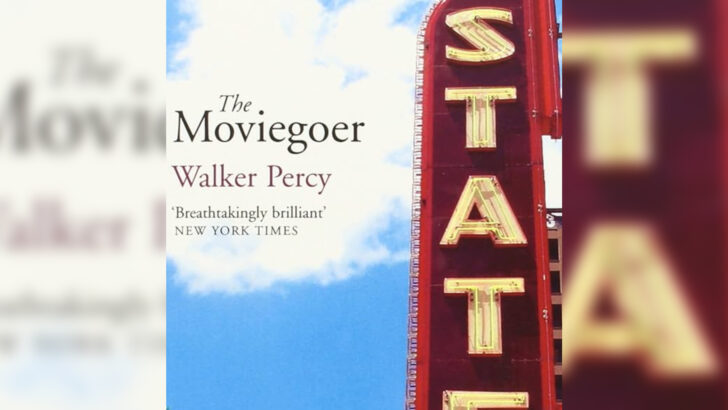While many book reviews tend to focus on new releases it is of course important as well to call attention to works that, though they are long standing, still have much to offer. These foundational works of fiction, whether Catholic or not, can enrich the lives of readers of all ages and from all ages. There is a reason they have stood the test of time while their contemporaries have faded into obscurity. It is always intriguing to consider which modern books will stand the test of time and what lessons they’ll impart to future generations.
That said, this is one of those cases where I am unsure whether to this book to a wide audience, though I believe that certain readers will find it deeply rewarding. The Moviegoer by Walker Percy was first recommended to me by a friend whose recommendations I take with the utmost seriousness. So, I quickly whisked the book from the shelves of my local used book shop. When I finished reading it for the first time, I wasn’t sure what to think. I asked my friend for his take on the book only to learn that he had a similar experience and had only recommended it to me to hear my thoughts. And our discussion of The Moviegoer, came to a standstill.
However, over the years this book has haunted me, probably because I had not understood it. Some novels also have a way of calling you back, again and again. Their landscapes and story beats remain the same, but as you grow, you become aware of different facets. Something catches your attention and what was old has been made new. With Lent approaching, I felt it was time once more to embark on this journey.
I am a model tenant and a model citizen and take pleasure in doing all that is expected of me”
The Moviegoer chronicles the existential wanderings of one Jack ‘Binx’ Bolling in the days leading up to Mardi Gras and Ash Wednesday. Binx is a New Orleans stockbroker who takes finds pleasure in the small comforts of modern life – his club cards, his casual flings with secretaries, his ability to make money, and, most of all, his trips to the movies. Early on he says, “I am a model tenant and a model citizen and take pleasure in doing all that is expected of me.” Yet beneath this carefully maintained ordinariness, he is haunted by a deep restlessness. Struggling with the lingering trauma of the Korean War and the weight of his family’s legacy, Binx drifts through life, unable to form lasting relationships.
All of this culminates in what Binx calls “the search.” He describes it – “the search is what anyone would undertake if he were not sunk in the everydayness of his own life … To become aware of the possibility of the search is to be onto something. Not to be onto something is to be in despair.” While not explicitly religious, his search aligns with the words of St Augustine: “Our hearts are restless until they rest in You.”
Distractions
Throughout the novel, Binx drifts through the spiritual malaise of postwar America, a world numbed by consumerism and distraction, where despair is quietly kept at bay with entertainment. If anything, the spiritual landscape has only worsened in the decades since the novel’s publication – our distractions are more immediate, more accessible, and more relentless. Close at hand, sitting in our pockets. The everyday malaise Binx describes remains unchanged: “The world is lost to you, the world and the people in it, and there remains only you and the world and you are no more able to be in the world than Banquo’s ghost.”
At its core, the novel is a pilgrim’s tale, akin to The Divine Comedy, though without its cosmic scale”
Beyond this, The Moviegoer traces the journey of a man moving, albeit reluctantly, toward the high call of love, responsibility, and self-sacrifice. His complicated relationship with Kate, a woman trapped in her own cycles of existential crisis, forces him to abandon his detachment, his moviegoing, and to truly engage with another human being. In trying to help her, Binx is drawn out of himself, into the messy, painful entanglements of real life, but also into the possibility of genuine love and an unfiltered experience of the everyday, free from malaise.
Search
At its core, the novel is a pilgrim’s tale, akin to The Divine Comedy, though without its cosmic scale. Like Dante, Binx begins in a kind of existential limbo, lost in the confusion of modern life, and must journey through his own form of purgatory, confronting despair and detachment before moving toward a form of redemption.
As we enter our own period of Lenten journeying, it is important for Catholics to examine our own distractions and comforts – our own “moviegoing” – and ask whether we are truly searching for God or merely passing the time. It is a season in which we follow Christ into the desert, dying to self to truly live. Binx Bolling’s search is not the saint’s journey, but it is a profoundly human one, marked by missteps yet always open to the possibility of grace. For Catholic readers, especially during Lent, The Moviegoer is a mirror and a challenge: Are we truly searching for God, or are we merely moviegoers in our own lives?



